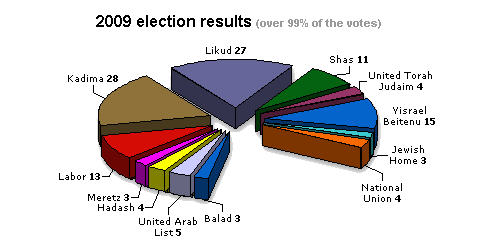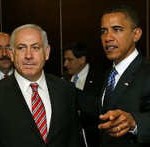If Livni succeeds (and I predict she will despite Israel’s notoriously fractious politics), she will become the second female prime minister in the country’s short 60-year history. It’s anybody’s guess, however, what her election would portend for Israel’s two most-pressing national issues, namely its looming war with Iran and elusive peace with Palestine.
But, given that it was [Livni’s Kadima Party leader] PM Ehud Olmert who launched air strikes against Syria (as a dry run for Iran?), bungled a Bush-like ground war against Hezbollah in Lebanon, and presided over perennially feckless peace talks with the Palestinians, nobody should expect her to usher in much change in Israeli politics. After all, just as Americans expect John McCain to continue the policies of George W. Bush [if he’s elected], Israelis expect Livni to continue those of Olmert.
On the other hand, if that preternatural warmonger Netanyahu becomes prime minister, war with Iran and no peace with Palestine are virtually guaranteed.
[Livni on track to become Israel’s second female prime Minister, TIJ, September 18, 2008]
Once again, the Israelis have demonstrated why theirs is the most fractious and vexatious electorate in the world.
National elections on Tuesday presented them with a clear choice between parties that would keep the country on the roadmap to peace with the Palestinians (Syrians and Iranians) and those that would take it on a path to war. Yet the official results are only bound to guarantee more fractiousness and vexation.
 Specifically, Foreign Minister Tzipi Livni’s Kadima Party, which favors peace negotiations with the Palestinians, won the most parliamentary seats with 29. Unfortunately, that was not nearly enough to command a mandate.
Specifically, Foreign Minister Tzipi Livni’s Kadima Party, which favors peace negotiations with the Palestinians, won the most parliamentary seats with 29. Unfortunately, that was not nearly enough to command a mandate.
By contrast, Benjamin Netanyahu’s Likud Party, which utterly rejects negotiations, won 28. But he would have an easier time forming a coalition government with Avigdor Lieberman’s Yisrael Beitenu Party, which won 15 seats. After all, Lieberman’s party is not only more opposed to negotiations with the Palestinians than Netanyahu’s; it even endorses nationality tests for Arab Israelis (who comprise 20 percent of the population) amongst other neo-Nazi policies.
Nevertheless, there’s no telling which of the country’s 12 parties will comprise the coalition government once the horse trading amongst them ends – weeks, if not months, from now.

But since it falls to President Shimon Peres, himself a member of the Kadima Party, to tap either Livni or Netanyahu to try to form a government, I suspect he will use all of his powers of persuasion in consultations with party leaders to ensure that Livni becomes the next prime minister of Israel. I fear, however, that the prevailing sentiment against her plan to negotiate with the Palestinians is such that Peres will have no choice but to tap Netanyahu.
With God’s help, I will lead the next government… The national camp, led by the Likud, has won a clear advantage. (Netanyahu)
Today the people chose Kadima. … We will form the next government led by Kadima. (Livni)
Let the trading begin….
 NOTE: If Netanyahu and his far-right allies end up forming the government, this will lead inexorably to the greatest tensions in the history of bilateral relations between Israel and its indispensable patron, the United States. And that Barack Obama – who will urge negotiations – just happens to be president at this potentially combustible time will only make those tensions (amongst Israelis) more visceral, if not indignant.
NOTE: If Netanyahu and his far-right allies end up forming the government, this will lead inexorably to the greatest tensions in the history of bilateral relations between Israel and its indispensable patron, the United States. And that Barack Obama – who will urge negotiations – just happens to be president at this potentially combustible time will only make those tensions (amongst Israelis) more visceral, if not indignant.
Related commentaries:
Livni on track to become Israel’s second female prime Minister
Leave a Reply
You must be logged in to post a comment.